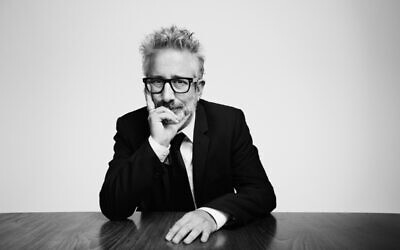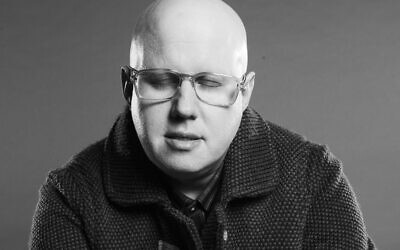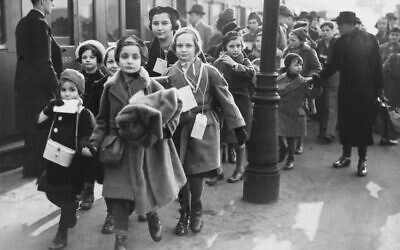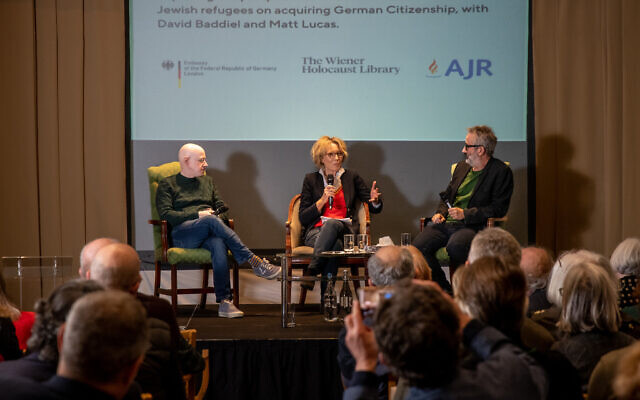David Baddiel and Matt Lucas discuss acquiring German citizenship
The event, at Westminster Synagogue, took place under the auspices of the AJR, Wiener Holocaust Library and German Embassy.
Jenni Frazer is a freelance journalist
According to comedian Matt Lucas, who has already been through the process, the only reason his fellow comedian David Baddiel would apply for German citizenship is because “Jews don’t queue”.
The pair, both descendants of German Jews who survived the Holocaust by fleeing to Britain, were taking part in an at times light-hearted discussion about acquiring German nationality.
The event, held at Westminster Synagogue, took place under the auspices of the Association of Jewish Refugees, the Wiener Holocaust Library and the German Embassy.
To a packed in-person and virtual audience, the German deputy ambassador, Rudiger Bohn, gave a passionate address in which he noted that Germany today was now home to the eighth largest Jewish community in the world.

“Fundamentally Jews are part of our society”, he said, and “though the wrong that was done cannot be undone,” nevertheless the Jewish presence today was “an extraordinary gift to us”.
Each application, the diplomat said, “is a huge step forward for our society. I stand in awe of everyone who takes this step. But it is not simply about a bureaucratic procedure. And I fully understand if there are people who say they cannot do it because of what happened to their family”.
But in the discussion which followed, moderated by the German writer Karina Urbach, both Matt Lucas and David Baddiel gave thoughtful responses as to why they had considered seriously taking the step. Lucas has already acquired German citizenship and praised the German embassy staff, and the Association of Jewish Refugees, for their often sympathetic help.

David Baddiel said he had not yet gone through the process, though he had been thinking about it for two years. His mother had been born in Germany and arrived as a baby in Britain with her parents. “Straightforwardly, my first motivation was Brexit, because if you’re British and travelling in Europe… well, it’s just very annoying now.
“My family got out just before the war. My mother had quite a lot of anger and rage towards Germany and I’m not entirely sure how she would feel about my trying to acquire a German passport.
But I came to the conclusion that because of the outrage that happened to my mother and her parents — their passports were taken away, they were disenfranchised and they lost everything — then the right thing to do, in some sort of spiritual way, is for that to come back. By continuing to ignore the possibility of citizenship, I am continuing what the Nazis started — they said they didn’t want Jews to have anything to do with Germany. From that point of view, it’s a reparation”.
Matt Lucas agreed that his catalyst for acquiring German citizenship had initially been Brexit. “To me, it felt almost complacent to leave Europe. I looked into whether there was a way I could stay. My grandmother was from Berlin. The official line is that Germany invites people who are eligible for citizenship to come and get it. I accepted the invitation.
“The Germany of today is not the Germany of my grandmother’s time, and nor is Britain the same sort of country that she came to. So taking German citizenship is not a lack of gratitude to Britain, as the descendant of someone whose life was saved by being allowed to come here.”
Neither felt that becoming German was in any way a “betrayal” of Britain. David Baddiel said it would not make him feel any less British, but thought it would be a symbolic action.
But — as with people in the audience — there was no unified response from Lucas and Baddiel’s families about the idea. Matt Lucas said he had asked his mother and brother if they were interested in taking the same step, but they declined, believing Lucas’s grandmother would not have been comfortable.

Although there was praise for the AJR, the Wiener Holocaust Library, and the embassy for their help in finding the relevant documents to make an application, David Baddiel believed the process was unnecessarily complex. He had his mother’s birth certificate and felt that should be sufficient — adding that the German obsession with documentation should mean that there were available records in Germany, without putting the search process burden on the applicant.
Some remarkable stories emerged from the audience. Jo Rynhold described her application as “long, protracted and emotional” — but then spoke of the extraordinary coincidence of finding that her work colleague was also the descendant of German Jews, specifically lawyers who had tried to use legal actions against the Nazis, and was going through the same process.
Felix Couchman, who is in the middle of the application process, is the son of a woman who arrived in Britain with the Kindertransport. He was acquiring German citizenship, he said, “for her and for all our family members who did not survive”.
Simon Burne is also the son of someone who arrived on the Kindertransport. He took the step of applying for citizenship about 10 years ago, particularly conscious that since his family could be traced back to the 12th century in Germany, “there is no way that the Nazis are going to wipe that connection — we are German Jews”.
And to the delight of Lucas and Baddiel, both serious football fans, Burne spoke about his great-uncle Gottfried Fuchs, a German Jewish footballer, who scored a then world record 10 goals against Russia in the 1912 Olympics. Fuchs — who escaped first to Britain and then to Canada — remains one of only two Jews ever to have played football for Germany.
The event was also addressed by the chief executive of the AJR, Michael Newman, who has himself acquired German citizenship, and the Wiener Holocaust Library’s Toby Simpson, who spoke about the way in which the library could assist people searching for information about their families.

Thank you for helping to make Jewish News the leading source of news and opinion for the UK Jewish community. Today we're asking for your invaluable help to continue putting our community first in everything we do.
For as little as £5 a month you can help sustain the vital work we do in celebrating and standing up for Jewish life in Britain.
Jewish News holds our community together and keeps us connected. Like a synagogue, it’s where people turn to feel part of something bigger. It also proudly shows the rest of Britain the vibrancy and rich culture of modern Jewish life.
You can make a quick and easy one-off or monthly contribution of £5, £10, £20 or any other sum you’re comfortable with.
100% of your donation will help us continue celebrating our community, in all its dynamic diversity...
Engaging
Being a community platform means so much more than producing a newspaper and website. One of our proudest roles is media partnering with our invaluable charities to amplify the outstanding work they do to help us all.
Celebrating
There’s no shortage of oys in the world but Jewish News takes every opportunity to celebrate the joys too, through projects like Night of Heroes, 40 Under 40 and other compelling countdowns that make the community kvell with pride.
Pioneering
In the first collaboration between media outlets from different faiths, Jewish News worked with British Muslim TV and Church Times to produce a list of young activists leading the way on interfaith understanding.
Campaigning
Royal Mail issued a stamp honouring Holocaust hero Sir Nicholas Winton after a Jewish News campaign attracted more than 100,000 backers. Jewish Newsalso produces special editions of the paper highlighting pressing issues including mental health and Holocaust remembrance.
Easy access
In an age when news is readily accessible, Jewish News provides high-quality content free online and offline, removing any financial barriers to connecting people.
Voice of our community to wider society
The Jewish News team regularly appears on TV, radio and on the pages of the national press to comment on stories about the Jewish community. Easy access to the paper on the streets of London also means Jewish News provides an invaluable window into the community for the country at large.
We hope you agree all this is worth preserving.






















